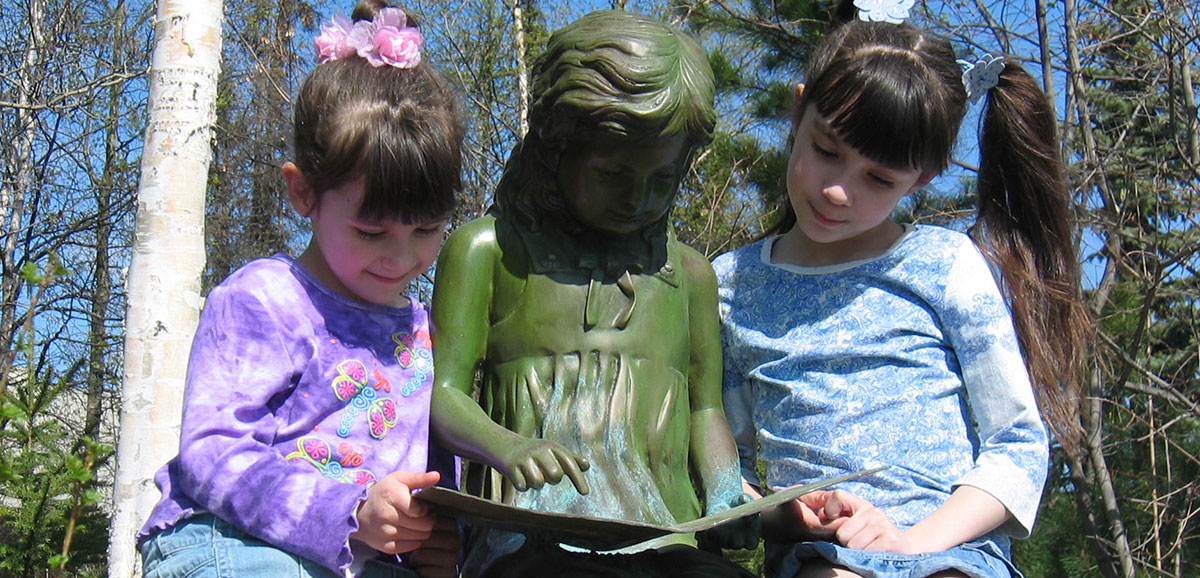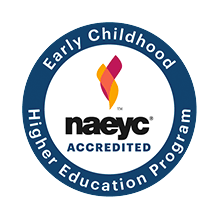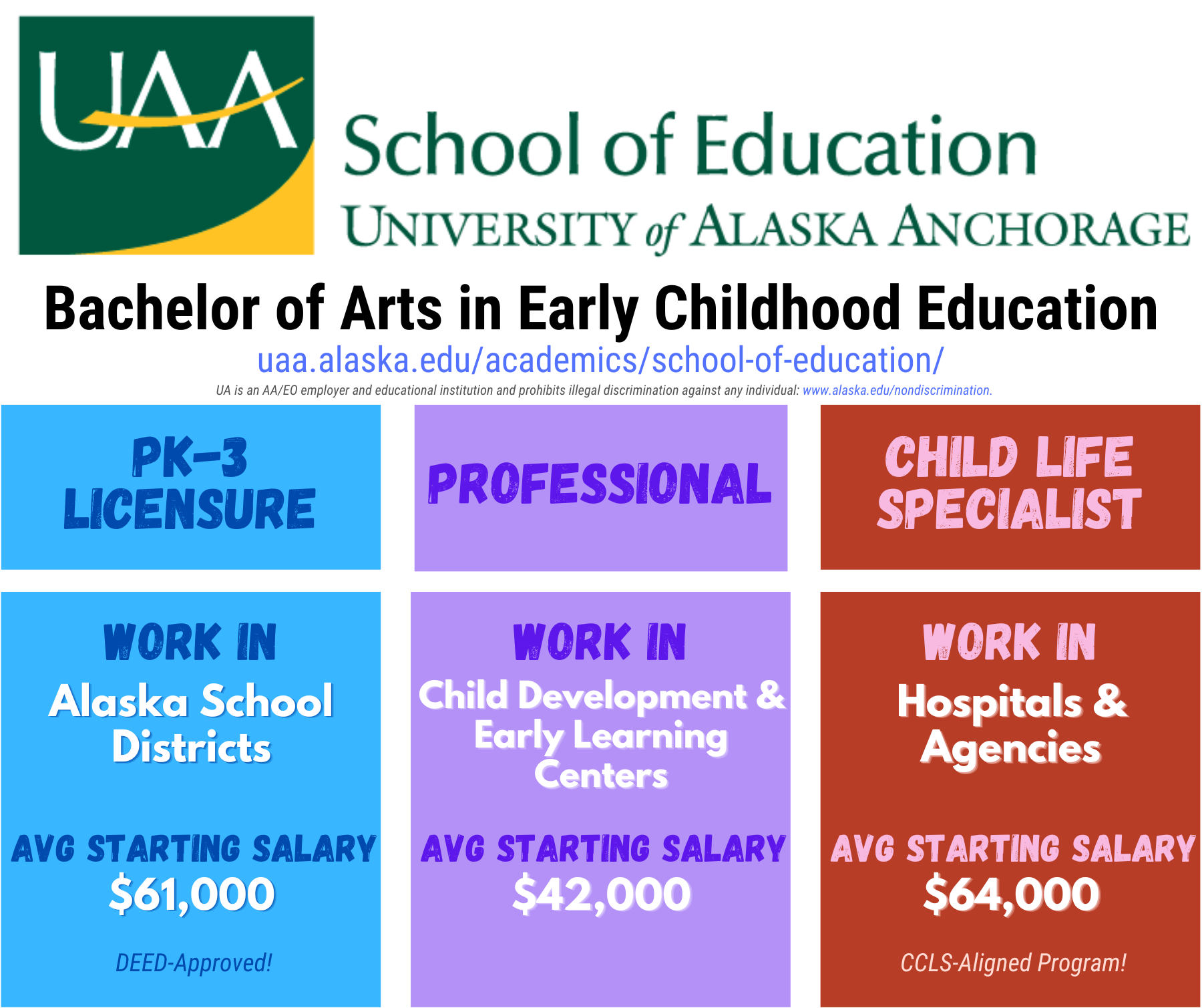Early Childhood

The Early Childhood program at UAA blends theory and practice in the preparation of early childhood educators who can deliver quality care and education for young children from birth through age eight.
Program Overview
 The focus of the degree is understanding child development, strengthening observation
abilities and developing skills working with young children. In addition, this program
will familiarize students with resources for continuing professional growth, and provide
opportunities to discuss best practice with others in the field.
The focus of the degree is understanding child development, strengthening observation
abilities and developing skills working with young children. In addition, this program
will familiarize students with resources for continuing professional growth, and provide
opportunities to discuss best practice with others in the field.
The department believes that children build their understanding of the world by interacting with objects and activities, with adults and with other children. We also believe that adults learn best by interacting with other adults in discussion, experimentation, and reflection. Students are asked to stretch their thinking and share their experience with other students in the program.
Students can choose between the Occupational Endorsement Certificate in Infant and Toddler Development, Associate of Applied Science degree (NAEYC-accreditated), or Bachelor of Arts in Early Childhood Education degreee that may include licensure to teach up through third grade. Ready to increase your understanding and excitement about working with young children? Speak with any Early Childhood faculty member the Student Success Coordinator today!
The Early Childhood Education program is designed to meet the educational requirements for professional licensure or certification in Alaska. However, the program might not meet the educational requirements for other states' professional licensure or certification. Please see UAA’s Licensure and Certification website for more information.
Academic Pathway
Catalog links to current catalog year; see the catalog archives to view previous years.
Background Checks & Applications
Note that clearing an initial background check is required of all undergraduate students in the first semester of enrollment for placement in course-based clinical field experiences. Additionally, undergraduate students are required to submit supplemental applications to the Student Success Office to facilitate practicum/internship placement and licensure processes.
Frequently Asked Questions
-
What undergraduate education degrees are offered by the School of Education at UAA?
Are they accredited?
The University of Alaska Anchorage has been continuously accredited by the NWCCU since 1974. Additionally, the Associate of Applied Science (AAS) Degree in Early Childhood Development has been recognized by the NAEYC through 2025 for specialized accreditation. The Early Childhood program also offers an Occupational Endorsement Certificate in Infant and Toddler Development. The Bachelor of Arts in Early Childhood Education (BAEC) allows students to choose one of three concentrations: PK-3 Licensure, working in Alaska School Districts; Professional, working in child development and early learning centers; or Child Life Specialist, working in hospitals and agencies. The PK-3 Licensure concentration is DEED-approved for PK-3 licensure, and the Child Life Specialist concentration is aligned with the Certified Child Life Specialist (CCLS) credential.

-
How does UAA address literacy development and the Science of Reading?
UAA SOE teacher candidates receive strong support for literacy development and the Science of Reading.
- Through the Language & Literacy Foundations Phase (EDEC A320 & EDEC A321), coursework introduces the five components of reading, evidence-based theory & strategies, the Science of Reading, and dual/multi-language acquisition (ELL). During the Strategies & Implementation Phase (EDEC A404), coursework provides an opportunity to practice culturally responsive lesson planning, reflective teaching with the Science of Reading, responsible assessment, and the continuous improvement reading cycle.
- Required readings during the Language & Literacy Foundations Phase include the Alaska Reading Playbook, Steps to Success: Crossing the Bridge Between Literacy Research and Practice, and Planned Language Approach (PLA): Research Based Literacy and Language Practices. Required readings during the Strategies & Implementation Phase include Integrating Reading Foundations: A Tool for College Instructors of Pre-service Teachers, Foundational Skills to Support Reading for Understanding in Kindergarten Through 3rd Grade, and the Teaching Reading Sourcebook.
- Field experiences in classrooms and learning centers require teacher candidates to generate literacy profiles of learners based on live observation and video recordings. Future Seawolf Teachers observe, document, and reflect as they recommend strategies and assessments for their young learners. Additionally, teacher candidates are evaluated by a university supervisor and their mentor teacher with specific scaled and open-ended questions on reading instruction performance.
- The new UAA SOE Literacy Lounge provides a collaborative and engaging space on campus that integrates into coursework, challenging teacher candidates to curate specific collections to showcase, and serves as a supplemental instructional lab for special literacy workshops led by school-district partners, reading instruction demonstrations with classroom kits and screening tools, and summer/enrichment literacy programs co-led by future Seawolf Teachers and their faculty.
These four pillars of literacy development in the UAA Early Childhood Education program are available as a fishbone diagram illlustrating components.
-
Why should I take classes at UAA?
UAA offers classes in person and online, with most scheduled meetings after 4 PM. Your advisor and the Student Success Coordinator will ensure that you have a personalized learning experience that fits your needs, and our classes are fun and easy to integrate into your important work with children and their families.
-
Are Kodiak College and Kenai Peninsula College part of UAA? Do they offer the same
courses?
YES! KoC and KPC are UAA community campuses. You can take classes at all three campuses to fit your busy schedule, and we offer a rotation for every course to be offered every year. Don't see the class listed that you need? Contact the Student Success Coordinator.
-
What classes should I start with? What should sign up for right now?
Regardless of what semester you might start, begin with EDEC A105 Introduction to the field of Early Childhood and/or EDEC A106 Creativity and the Arts for Young Children. These courses are offered every fall and spring to help you jumpstart your education and career.
- What does a class look like?
In person classes meet in Anchorage or Juneau one evening a week in a small group setting. Synchronous online classes meet once a week via Zoom in a small group setting. Asynchronous online classes are available in Blackboard, and you can work at your own pace to meet set deadlines and expectations. Some classes blend face-to-face classes and online work to meet learning outcomes. Check with the assigned instructor to learn more about a class. Note that all classes require meaningful assignments with practical guidance you are expected to apply and reflect on as you develop the dispositions of a teacher. If a class requires clinical field experiences, the Student Placement Coordinator will assign you to a local (to you) school, facility, or agency.
-
I took Early Childhood classes a long time ago, will they transfer?
Most courses will transfer! Contact the Student Success Coordinator and ask for a transcript analysis to determine your options. This process will include submitting petitions to accept as much of your previously completed coursework as possible and preparing a customized, step-by-step plan of completion.
-
Will my degree in Early Childhood include teacher licensure?
Yes! The Alaska Department of Education & Early Development has approved the BAEC with licensure. Your program preparation will include completing the necessary background checks and applications to earn a Type A license after completion of the degree requirements.
-
How can I pay for my classes?
Scholarship: Students pursuing a Bachelor of Arts in Early Childhood Education, Type A licensure, are eligible and encouraged to apply for the Marie Paxson CARTA Educator Scholarship! The Central Alaska Retired Teachers Association (CARTA) is offering up to three $2,500 scholarships for the 2025-2026 academic year.
If you are from Anchorage, the Mat-Su, the Kenai Peninsula, or Kodiak and plan to teach or lead in Alaska’s public schools, this is your chance to receive financial support for your educational journey. Don’t miss this incredible opportunity to invest in your future and make a difference in Alaska’s classrooms!Apply today at https://bit.ly/carta25
Deadline: April 2, 2025, by 11:59 p.m.
Questions? Reach out to Fran Talbot at ftalbottak@gmail.com or 907-227-2421.
This scholaship opportunity is also available to those pursuing Type B and C license.
More scholarships through UAA are available. Tuition reimbursement is also available through THREAD. Be sure to ask your employer if they offer education or tuition benefits. -
What is a Child Life Specialist?
A child life specialist is a licensed healthcare-education professional who works with young children to help them cope with the stress and trauma they experience during medical emergencies or hospitalization. Certified CLS staff help improve the quality of patient and family care using evidence-based, developmentally and psychologically appropriate interventions including therapeutic play, preparation for procedures, and education to reduce fear, anxiety, and pain.
The CLS concentration of the BAEC aligns with required coursework of CLS certification academic requirements, and all clinical experiences are completed under the direction of a Certified CLS in a medical setting.
- Early Childhood Resources
- Thread - Resource and referral - offers reimbursement and PD
- SEED - housed at Thread - houses registry of EC workers in the state - includes P-6 but only required for licensed EC programs (childcare/preschools)
- Learn & Grow - AK Quality recognition and improvement system
- Economic Impact Study
- DEED EC
- Parents as Teachers
- Best Beginnings
- Alaska Head Start Association
- Mat-Su Health Foundation









